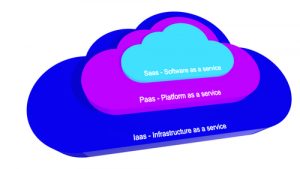 When figuring out how the cloud works, it may appear overwhelming to you and to many other people, but the reality is that the information we see and share online has become increasingly interconnected — and it can become easily compromised if it isn’t properly protected. Cloud computing has become the way many organizations share information, software, and resources via a single network. The “cloud” is simply another way to refer to the Internet. According to recent research from IBM, 81% of all companies possess a multi-cloud strategy that involves a blend of private and public cloud options. Let’s take a look at how the cloud works and the various types of cloud services that exist.
When figuring out how the cloud works, it may appear overwhelming to you and to many other people, but the reality is that the information we see and share online has become increasingly interconnected — and it can become easily compromised if it isn’t properly protected. Cloud computing has become the way many organizations share information, software, and resources via a single network. The “cloud” is simply another way to refer to the Internet. According to recent research from IBM, 81% of all companies possess a multi-cloud strategy that involves a blend of private and public cloud options. Let’s take a look at how the cloud works and the various types of cloud services that exist.
How Does Cloud Computing Work?
Data is generally stored on servers (virtual or physical) that a cloud computing provider like Amazon’s AWS, Google Cloud, or Azure provides. The primary thing you need in order to use cloud computing services is a reliable Internet connection. Organizations have been striving to find ways to ensure cloud computing is performed with a certain degree of security, especially tech companies and government agencies that handle large amounts of sensitive information.
What Are the Different Types of Cloud Services?
There are many kinds of cloud services, although we will focus on three in particular: Software-as-a-Service (SaaS), Platform-as-a-Service (PaaS), and Infrastructure-as-a-Service (IaaS).
Software-as-a-Service
 Software-as-a-Service is a software licensing and distribution model that involves a third-party provider who hosts applications and allows consumers to easily access them on the Internet. Microsoft 365, Dropbox, and GoToMeeting are all examples of SaaS. Many of these types of software and applications are run directly through a web browser. Thus, they need no client-side installations or downloads. According to the IT management statistics provider Computer Economics, 60% of all businesses have now incorporated some types of SaaS solutions into their organization’s practices. Of these companies, 36% plan to increase investment in SaaS over the next few months.
Software-as-a-Service is a software licensing and distribution model that involves a third-party provider who hosts applications and allows consumers to easily access them on the Internet. Microsoft 365, Dropbox, and GoToMeeting are all examples of SaaS. Many of these types of software and applications are run directly through a web browser. Thus, they need no client-side installations or downloads. According to the IT management statistics provider Computer Economics, 60% of all businesses have now incorporated some types of SaaS solutions into their organization’s practices. Of these companies, 36% plan to increase investment in SaaS over the next few months.
Platform-as-a-Service
These types of services offer cloud components to some software while remaining primarily utilized for applications. The method for delivering PaaS is similar to the one used for SaaS, although there is one difference: rather than distribute the software online, PaaS offers a platform to create software. Common examples of PaaS include Google App Engine, AWS Elastic Beanstalk, Windows Azure, and OpenShift. One of the many benefits of PaaS is that very little coding is needed when compared to other types of cloud computing services. PaaS can also help automate your organization’s business policies.
Infrastructure-as-a-Service
Cloud infrastructure services, which are also called commonly IaaS, are comprised of automated and highly scalable computing resources. Thanks to IaaS, your organization can buy resources as necessary rather than purchase large packages that you may just partially need. The cloud servers that IaaS distributes are usually provided to a company via an API or a dashboard. Thus, clients can have virtually total control over the whole infrastructure.
One notable difference between IaaS and SaaS or PaaS is the fact that with IaaS, clients are the ones who have to manage applications, operating systems, and data, among other things. Nevertheless, IaaS providers still handle things like servers, hard drives, storage, and networking.
 According to Statista, SaaS made up 64.16% of the global public cloud market share in 2016, a figure that marked a 10% drop from 2012. Meanwhile, the shares of both PaaS and IaaS increased by 0.01% and 10%, respectively, during this four-year span. This trend is expected to continue in the coming years, although SaaS is still projected to make up the largest share of cloud computing services overall.
According to Statista, SaaS made up 64.16% of the global public cloud market share in 2016, a figure that marked a 10% drop from 2012. Meanwhile, the shares of both PaaS and IaaS increased by 0.01% and 10%, respectively, during this four-year span. This trend is expected to continue in the coming years, although SaaS is still projected to make up the largest share of cloud computing services overall.
Speak With SeaGlass Technology For More Information
Contact the professionals at SeaGlass Technology in New York City to learn more about how the cloud works and the benefits and disadvantages of services like SaaS, Paas, and IaaS. Our holistic approach is designed to help meet your organization’s unique needs.
The professionals at SeaGlass Technology are highly certified and know a lot about ISVs and OEMs, and we offer 24/7 monitoring and protection so that you have no need to worry about being attended to. Our affordable cloud-based solutions include monitoring, migration, configuration, security, server management, and disaster recovery. Our staff can assist your organization with iCloud, Office 365, SkyDrive, Hosted Microsoft Sharepoint, cloud backups, and Google Apps, among other things. We also provide a mix of public and private hybrid cloud services.
Call SeaGlass Technology today at (212) 886-0790 or contact us online to schedule a consultation or to learn more about our work.



